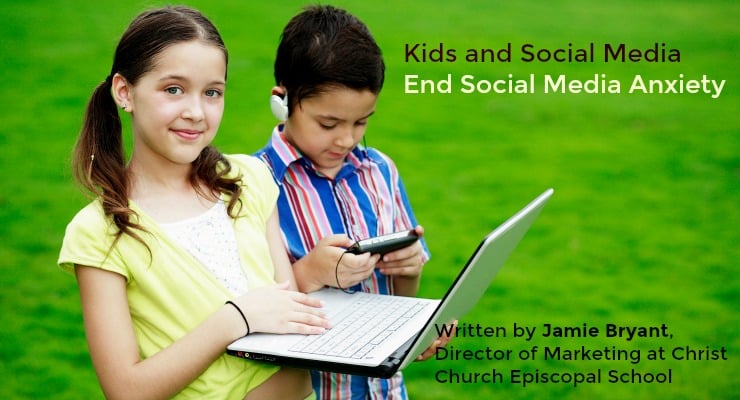The pervasiveness of social media is hard to escape. We tag, share, pin, post, tweet, and snapchat to our hearts delight. Ah yes, the verbs of social media continue to grow like a bountiful garden photosynthesized on hashtags and emojis. Our kids are using social media with similar lavish profusion and it seems as if the more they feed and nurture these frenzied gardens, the more anxiety and angst grow like weeds among it.
To be in the know, yet not become too absorbed, overly preoccupied, and distracted is a tricky juxtaposition. For many kids the need for more likes, followers, and retweets becomes an obsession. Where do we, as parents, step in? How can parents identify social media anxiety in their kids? How can they prevent it?
Thank you to our sponsor Christ Church Episcopal School for providing this content.
Christ Church Episcopal School (CCES) places great emphasis on the role of technology in the classroom, as early as Primer (K5). With that comes great responsibility, which is why we at CCES are intentional about our focus on online safety training, including ethical use of digital media and social media, in each division’s curriculum. Lydia Pettigrew, the Middle School counselor at CCES and Valerie Riddle, Lower School Assistant Director and Chaplain, spend a lot of time guiding parents and students on appropriate behaviors regarding social media. They have the following advice for parents.
Teach Kids About Social Media Early
“Social media usage in our society has evolved,” Pettigrew says. “It used to be that we didn’t have to worry about communicating with kids about social media at all, but our world has changed.” Pettigrew believes in exposing kids to social media early, as early as the 5th or 6th grade. “I believe we need to allow kids to start using social media and learning the tools— for a restricted amount of time and with restricted access. When we have parents who are withholding it completely, their kids are not exposed to it and don’t learn the necessary tools to manage it when they are older.” Pettigrew and Riddle both recommend setting expectations and heavily monitoring a child’s use of social media. For example, they could be allowed access 20 minutes a day. Part of those expectations also include sitting down with your child, looking through their accounts, and talking about them.
Don’t Allow Devices in Kids’ Bedrooms at Night
Other guidelines to consider are not allowing devices in kids’ bedrooms at night. Keeping devices in bedrooms interrupts their rest and research shows that this type of fatigue increases levels of depression, anxiety and eating disorders among our youth. Consider a family docking station in the kitchen or office, or perhaps even keeping devices in the parents’ bedroom at night.
Understand Your Child’s Developmental Needs
“We know the adolescent brain is susceptible to addiction. Impulsivity is heightened at this age, so we have to help with that. Understanding where your child is developmentally, and putting in place restrictions and guidelines is necessary. No devices should be allowed in bathrooms, ever. It’s not a matter of trust, it’s a matter of kids being tempted.”
Encourage Time Unplugged
One thing social media slaps people hardest with is being excluded or FOMO. Encouraging solitude is one way we can protect our kids from this unease. Encourage time unplugged— reading a book or listening to music. “What I find is that the kids who are comfortable with solitude are the ones who can cope better with the social media pressures. If you are instilling in your child the value of solitude, the fact that his/her identity is not tied to being included or excluded, you are helping your child build the strongest tools he/she will need in navigating social media,” Pettigrew says.
Know When to Get Professional Help
“If your child is exhibiting belligerence or strong resistance when it comes to putting their device down, if it is very hard to establish rules around turning devices off at a reasonable hour, keeping devices out of the bedroom, or if your child feels like he/she needs to be looking at their device at every moment, even if you encourage different behaviors, that is when you need to look at the situation,” explains Pettigrew. “That’s when I recommend you sit down and talk about what their identity is based on, then determine what kind of guidelines need to be revisited and whether professional help is needed.”
Review Your Child’s Accounts Regularly
Pettigrew goes on to say that personally, she looks through her kids’ accounts regularly, though not frequently for patterns of unhealthy behavior or exposure. “It’s so important to know what’s going on in our kids’ lives. Make sure, however, that you as the parent are not motivated by or finding pleasure in delving into your child’s social life or seeking to live vicariously through your child’s social life. Your child should understand that your monitoring of their social media accounts is an expectation. You don’t need to say anything to your child about what you see on their accounts unless something stands out as a concern.”
Don’t Solve All Your Children’s Problems
It can be difficult to discern when it’s necessary to take action and when being confronted with an embarrassing or awkward social media situation is a normal part of the process of growing up. Social media platforms are all very public, making harsh statements all the more hurtful. They may not always rise to the definition of bullying, but are hurtful nonetheless. “We as parents of adolescents are not here to solve their problems. We are here to ask questions, to help them think through their choices and decisions” Pettigrew says. “Encourage your child to connect with that person individually. Something may have come across one way, but meant something entirely different. We all know things can easily be taken out of context.”
In today’s world, courses on social technology and responsibility are not only important to our school’s curriculum, they’re a part of our school’s responsibility. Kids need to know that the school sees this as a part of their development and a part of their education, and likewise the parents need to realize that. “It’s a struggle,” Pettigrew says. “What we’re constantly trying to get them to learn to do is solve their own problems. There’s certainly not one great program out there, it’s whatever works best with your population.”
[clickToTweet tweet=”Social media is not only important to a school’s curriculum, it’s part of a school’s responsibility.” quote=”‘Social media is not only important to a school’s curriculum, it’s part of a school’s responsibility.'” theme=”style3″]“If we can teach our kids some etiquette and the right way to be involved, social media is a positive tool for 21st century learning and enjoyment,” says Riddle. “It’s all about balance. Make sure you have the face to face time equal to the cyber time.”
Open House at Christ Church Episcopal School
Stop in for a personal tour of CCES on Tuesday, November 15th at 9:30 am or 6:00 pm. See for yourself what makes this school so special!
Have you begun talking with your kids about social media yet?
Here’s some more articles to learn about CCES and it’s programs in Greenville: Learn A Little More About CCES | What Are the Best Schools in Greenville SC
 Jamie Bryant, Director of Marketing and Public Relations at Christ Church Episcopal School, previously provided a broad range of marketing and communication services to private golf and resort clubs. She earned her degree in International Business from Clemson University. Jamie also serves as the JV Girls’ Lacrosse Coach at CCES. She is married to Garry and they have two children Alex and Francesca, both current students at CCES.
Jamie Bryant, Director of Marketing and Public Relations at Christ Church Episcopal School, previously provided a broad range of marketing and communication services to private golf and resort clubs. She earned her degree in International Business from Clemson University. Jamie also serves as the JV Girls’ Lacrosse Coach at CCES. She is married to Garry and they have two children Alex and Francesca, both current students at CCES.








